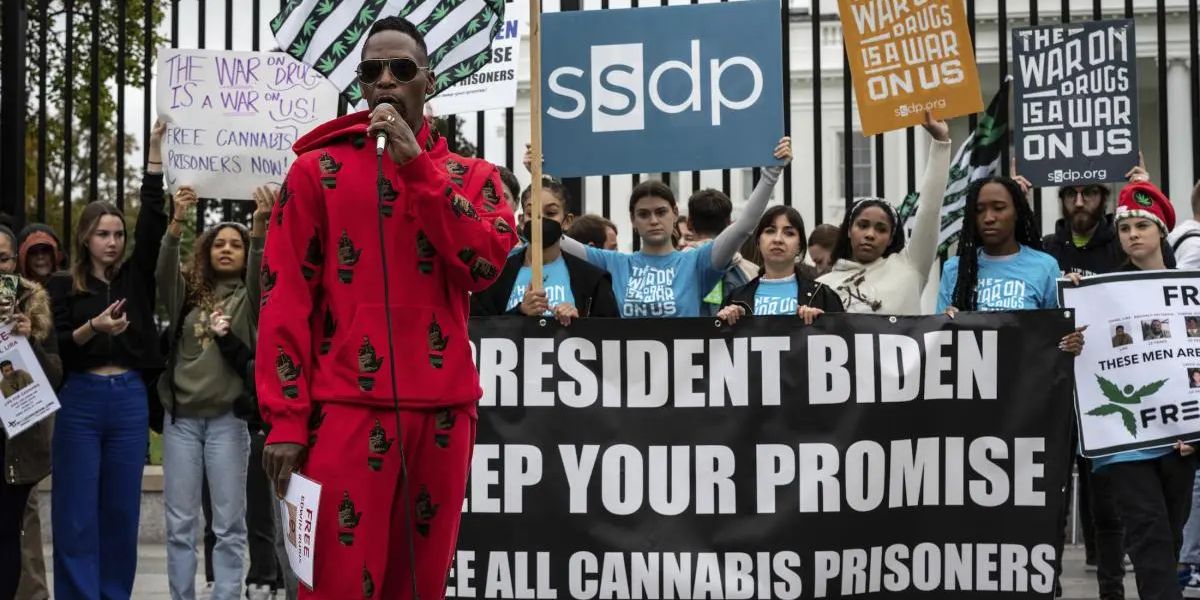“A Call to Action”: Advocacy Group Aims to Transform Kansas Cannabis Laws and Erase Criminal Records
OVERLAND PARK – Leaders of a new politically diverse alliance said Tuesday they are committed to backing candidates for the Kansas Legislature who want to eliminate the state’s prohibition on recreational cannabis and expunge marijuana-related criminal records.
Inga Selders, a Prairie Village City Council member and founder of the Cannabis Justice Coalition, expressed frustration with elected officials’ failure to deliver “fair and equitable” laws and policies that recognize the social, medical, and financial benefits of fully legalizing cannabis.
The bipartisan coalition would focus on educating voters about marijuana. It would focus on science and facts rather than the humorous fiction found in Cheech and Chong films from the 1970s and 1980s. Selders stated that this effort would be combined with political advocacy for state House and Senate candidates who support the legalization idea.
“Despite a majority of Kansans wanting recreational cannabis fully legalized in Kansas, most of our state legislators aren’t listening to the constituents and have turned cannabis reform into a partisan issue, when in fact it isn’t,” she stated.
The coalition’s board of directors included Barry Grissom, the United States Attorney for Kansas from 2010 to 2016 under President Barack Obama; Ian Graves, a Prairie Village City Council member, and marijuana decriminalization advocate; and Leslie Byram, an estate planning and probate attorney who frequently works with clients with special medical needs.
Law Enforcement Resources
During a news conference, Grissom stated that Kansas should embrace marijuana laws similar to Missouri and Colorado’s approaches to adult cannabis use. Colorado legalized recreational marijuana sales in 2014, and Missouri followed suit in February 2023. Grissom stated that his experience as a federal prosecutor and representing clients in private practice provided him with insight into criminal justice issues, especially the importance of making judicious use of law enforcement’s financial resources.
“I know that spending money on investigation, interdiction, arrest, prosecution, incarceration of individuals involved in some level of use of cannabis is bad public policy,” he stated. “It’s a waste of tax dollars. It is a waste of valuable resources that law enforcement requires to keep us all secure in our homes, neighborhoods, places of worship, and schools.”
He said it was a “good first step” for the US Department of Justice to recommend that marijuana be categorized as a Schedule III prohibited substance with other prescription medications rather than a Schedule I narcotic like heroin, LSD, and cocaine. It was evident that marijuana was not the same as heroin, he remarked.
He believes that the classification change will encourage further research into cannabis’s medical potential and downsides. However, he believes that a preferable method would be for the federal government to decriminalize marijuana and let each state to establish its own standards.
According to the Pew Research Center, 24 states and the District of Columbia have legalized marijuana for recreational use. Fourteen additional states have legalized cannabis for medical use.
‘Simply Ludicrous’
Graves, the other Prairie Village council member, said it was ridiculous that the Kansas City metropolitan area was divided into two regions, with marijuana smoking allowed in Missouri but outlawed in Kansas. Despite the border divide, he said that cannabis was widely used in both jurisdictions.
“I can tell you that cannabis is frequently consumed in Johnson County.” It’s already here,” said Graves, who thought Kansas’ marijuana restrictions were a waste of time to enforce. “Folks in law enforcement know that this just isn’t something we should be wasting our time on.” He stated that the solution for Kansas would be to enact a statewide marijuana legalization bill. A piecemeal approach to legalization by cities or counties, he added, would leave Kansans with a confusing mix of marijuana rules and resolutions to navigate.
Fort Hays State University’s annual “Kansas Speaks” public opinion survey will be issued in October 2023. According to the FHSU report, 67.2% of participants supported the recreational sale of marijuana to those aged 21 and older.
“Kansas has been surveyed repeatedly. The people of Kansas want recreational cannabis,” Graves stated. “What we need to do is educate people on where their elected officials stand.”
Decriminalization
Byram, an attorney with a practice that serves people with disabilities, said she knew of families who relocated to other states where cannabis products could be legally obtained for their children or other loved ones suffering from epilepsy, seizure disorder, cancer, insomnia, Alzheimer’s, and other mental health issues.
Kansans should not have to uproot their families in order to receive critical medical care using cannabis products, she added.
She suggested that the state invest tax income from cannabis sales to reduce waiting lists for services that should be provided to Kansans participating in Medicaid. She also suggested that the state should bolster its agricultural sector by doing cannabis-related university research. “I’ve educated myself on the decriminalization and the benefits that come from that and I’m largely supportive of legalization for recreational use for that purpose,” Byram stated. “A lot of resources can be rerouted to other law enforcement efforts.”
Selders stated that the coalition was dedicated to legalizing recreational marijuana rather than starting with medicinal cannabis. During the 2024 legislative session, lawmakers considered a bill to create a highly controlled five-year trial program for medical marijuana sales. The bill was given a hearing in a Senate committee, however, it was quickly deferred until 2025.
“Our biggest mission is to make cannabis legalization up front and central this election cycle,” Selders stated.











